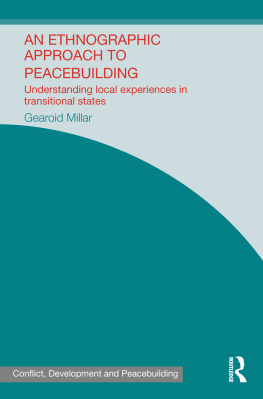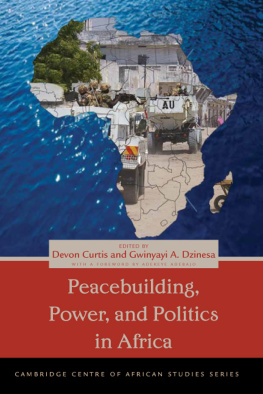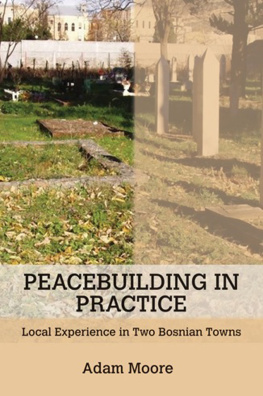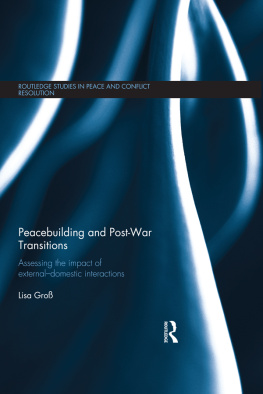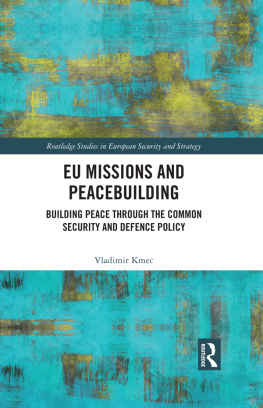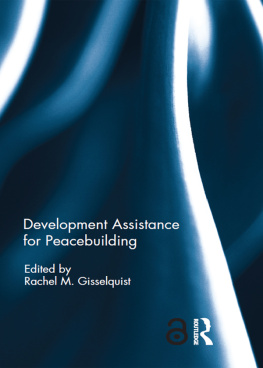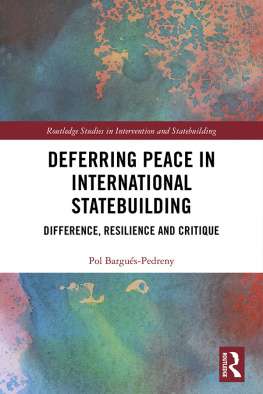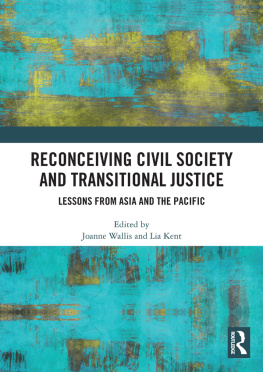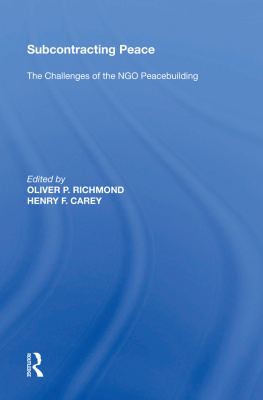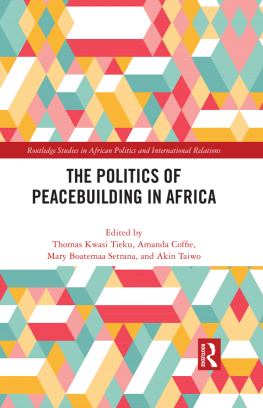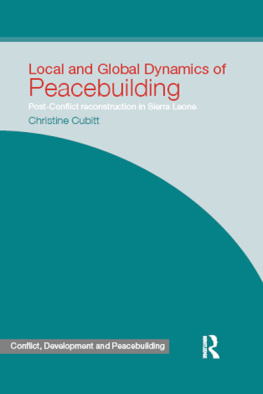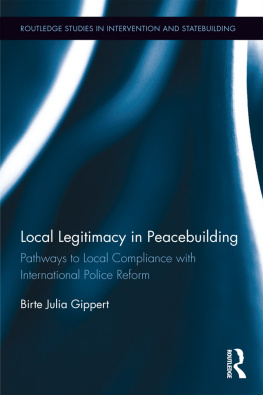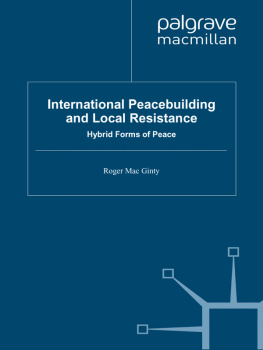An Ethnographic Approach to Peacebuilding
This book aims to outline and promote an ethnographic approach to evaluating international peacebuilding interventions in transitional states.
While the evaluation of peacebuilding and transitional justice efforts has been a growing concern in recent years, too often evaluations assess projects based on locally irrelevant measures, reinforce the status quo distribution of power in transitional situations, and uncritically accept the implicit conceptions of the funders, planners, and administrators of such projects. This book argues that evaluating the effects of peacebuilding interventions demands an understanding of the local and culturally variable context of intervention.
Throughout An Ethnographic Approach to Peacebuilding, the author draws on real-world examples from extensive fieldwork in Sierra Leone to argue that local experiences should be considered the primary measure of a peacebuilding projects success. An ethnographic approach recognizes diversity in conceptions of peace, justice, development, and reconciliation and takes local approaches and local critiques of the international agenda seriously. It can help to empower local actors, hold the international peacebuilding industry accountable to its supposed beneficiaries, and challenge the Western-centric ideas of what peace entails and how peacebuilding is achieved.
This book will be of great interest to students and scholars of peacebuilding, peace and conflict studies, transitional justice, African politics, ethnography, International Relations and security studies, as well as practitioners working in the field.
Gearoid Millar is Lecturer in Sociology at the Institute for Conflict, Transition, and Peace Research (ICTPR) at the University of Aberdeen, Scotland.
Series: Studies in Conflict, Development and Peacebuilding
Series Editors: Keith Krause, Thomas J. Biersteker and Riccardo Bocco, Graduate Institute of International and Development Studies, Geneva
This series publishes innovative research into the connections between insecurity and under-development in fragile states, and into situations of violence and insecurity more generally. It adopts a multidisciplinary approach to the study of a variety of issues, including the changing nature of contemporary armed violence (conflict), efforts to foster the conditions that prevent the outbreak or recurrence of such violence (development), and strategies to promote peaceful relations on the communal, societal and international level (peacebuilding).
The Political Economy of Peacemaking
Achim Wennmann
The Peace In Between
Post-war violence and peacebuilding
Edited by Mats Berdal and Astri Suhrke
Local and Global Dynamics of Peacebuilding
Postconflict reconstruction in Sierra Leone
Christine Cubitt
Peacebuilding, Memory and Reconciliation
Bridging top-down and bottom-up approaches
Bruno Charbonneau and Genevive Parent
Peacebuilding and Local Ownership
Post-conflict consensus-building
Timothy Donais
Stabilization Operations, Security and Development
States of fragility
Edited by Robert Muggah
Controlling Small Arms
Consolidation, innovation and relevance in research and policy
Edited by Peter Batchelor and Kai Michael Kenkel
An Ethnographic Approach to Peacebuilding
Understanding local experiences in transitional states
Gearoid Millar
An Ethnographic Approach to Peacebuilding
Understanding local experiences in transitional states
Gearoid Millar
First published 2014
by Routledge
2 Park Square, Milton Park, Abingdon, Oxon, OX14 4RN
and by Routledge
711 Third Avenue, New York, NY 10017
Routledge is an imprint of the Taylor & Francis Group, an informa business
2014 Gearoid Millar
The right of Gearoid Millar to be identified as author of this work has been asserted by him in accordance with sections 77 and 78 of the Copyright, Designs and Patents Act 1988.
All rights reserved. No part of this book may be reprinted or reproduced or utilised in any form or by any electronic, mechanical, or other means, now known or hereafter invented, including photocopying and recording, or in any information storage or retrieval system, without permission in writing from the publishers.
Trademark notice: Product or corporate names may be trademarks or registered trademarks, and are used only for identification and explanation without intent to infringe.
British Library Cataloguing in Publication Data
A catalogue record for this book is available from the British Library
Library of Congress Cataloging in Publication Data
Millar, Gearoid, author.
An ethnographic approach to peacebuilding : understanding local experiences in transitional states / Gearoid Millar.
pages cm. -- (Studies in conflict, development and peacebuilding)
1. Peace-building--Evaluation. 2. Peace-building--Social aspects. 3. Peace-building--International cooperation. 4. Peace-building--Sierra Leone--Evaluation. 5. Ethnology. I. Title. II. Series: Studies in conflict, development and peacebuilding.
JZ5538.M547 2014
303.66--dc23
2013045403
ISBN13: 978-0-415-87035-1 (hbk)
ISBN13: 978-0-203-70127-0 (ebk)
Typeset in Times
by Taylor & Francis Books
Contents
The ideas contained in this book have evolved over the past eight years during which I have lived in four different countries and worked with and learned from incredible colleagues and friends at a number of different institutions, all of whom deserve recognition. First, I thank former advisors and colleagues at American Universitys International Peace and Conflict Resolution (IPCR) program, Syracuse Universitys Program for the Advancement of Research in Conflict and Collaboration (PARCC), Radboud University Nijmegens Centre for International Conflict Analysis and Management (CICAM), and the Institute for Conflict, Transition, and Peace Research (ICTPR) at the University of Aberdeen. Colleagues and friends at each have provided invaluable encouragement and advice throughout the early years of my career.
For financial and logistical support, I must thank the Maxwell School at Syracuse University for four years of teaching and research assistantships, with which I also funded my ten months of fieldwork in 2008/2009, the Faculty of Management at Radboud University Nijmegen for funding my six months of fieldwork in 2012, the University of Makeni in Sierra Leone for a great amount of assistance with in-country housing and logistics, and the Max Planck Institute for Social Anthropology in Halle, Germany, for a period as a guest researcher in May of 2013 during which I completed drafts of three chapters of the book in quiet academic isolation.
I also want to recognize all of the anonymous reviewers who have read and commented on my work in the past and made my ideas and my arguments stronger. Although they are more completely and forcefully articulated in these pages the ideas presented in this book have developed and been partially presented in previous articles in the International Journal of Transitional Justice, the Journal of Peace Research, Conflict Resolution Quarterly, Human Rights Review, Peace and Conflict: The Journal of Peace Psychology, International Peacekeeping

